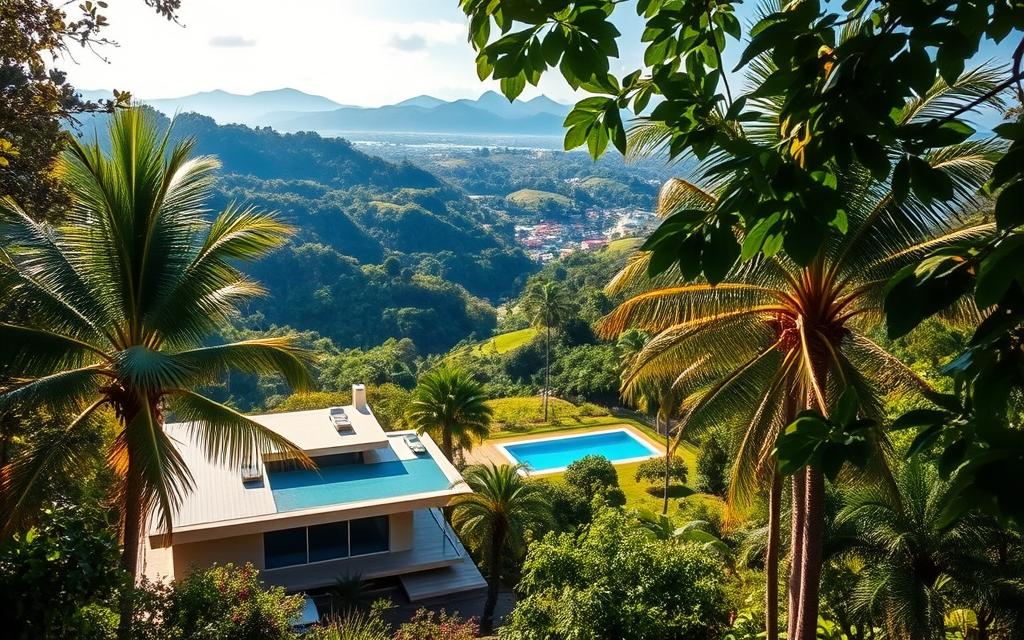Discover how to access significant funds with a Home Equity Loan Costa Rica. We offer competitive rates, flexible terms, and lower fees. Simplify your financing process today.

Costa Rica Property Investment for Foreigners: Secure Funding with Us
Investing in property in Costa Rica has become an attractive option for foreigners due to the country’s growing appeal as an investment destination. Costa Rica’s real estate sector is showing remarkable strength, driven by tourism growth, political stability, and an influx of digital nomads.
We connect borrowers with private investors and lenders, providing competitive rates and flexible financing options for property in Costa Rica. Our funding solutions help overcome traditional financing challenges for foreign investors, enabling them to secure the funds they need.
With a welcoming legal framework for foreign investment, Costa Rica offers a stable environment for investors to achieve returns through appreciation and rental income. We help investors navigate the market and maximize their investment potential in Costa Rica property.
The Costa Rica Real Estate Investment Opportunity
Foreign investment in Costa Rica’s real estate sector is on the rise, driven by promising market trends and growth potential. As we explore the opportunities available, it’s clear that Costa Rica offers a unique combination of natural beauty, economic stability, and investment potential.

Current Market Trends and Growth
The Costa Rican real estate market is experiencing significant growth, with prime locations seeing property values jump by 25-30% since 2020. Specific regions have shown remarkable year-over-year increases, such as Guanacaste, where apartment prices rose by 16.35% in June 2024, and San José, where properties saw a 12.08% increase during the same period.
- National rental yields average an impressive 7.27%, with San José properties reaching up to 8.25%.
- Experts project the residential market to grow at a compound annual rate of 3.88% through 2029, with values reaching USD 334.20 billion.
- The stable political environment and growing tourism industry create a solid foundation for real estate investment.
Why Foreign Investors Are Flocking to Costa Rica
Foreign investors are increasingly drawn to Costa Rica due to its growing digital nomad community, retirement appeal, and eco-tourism opportunities. The country’s infrastructure improvements and economic stability are also attracting more international investment capital to the real estate sector.
- Costa Rica’s unique blend of natural beauty and modern amenities makes it an attractive destination for investors.
- The country’s real estate market offers a range of opportunities, from coastal hotspots to urban and central valley properties.
Legal Framework for Foreign Property Ownership in Costa Rica
Understanding the legal framework for foreign property ownership in Costa Rica is crucial for investors. Costa Rica offers a welcoming environment for foreign investors, with laws that support property ownership by non-citizens.
Equal Ownership Rights for Foreigners
One of the most significant advantages for foreign investors is that they have the same ownership rights as Costa Rican citizens. This means that foreigners can purchase property without needing to apply for residency or citizenship, making the process more accessible. Most properties in Costa Rica are held with a fee simple title, a familiar structure for investors from the U.S. and Canada.
Important Legal Considerations
While the legal framework is favorable, there are important considerations for foreign investors. Proper due diligence and title verification are critical to ensure a secure investment. Working with qualified legal professionals is essential to navigate Costa Rica’s property laws.
Maritime Zone Regulations
A key legal consideration is the Maritime Zone regulation. Properties within the first 50 meters of the high tide line are considered public land and cannot be titled. The next 150 meters are classified as the Maritime Zone or Concession Land, requiring special concessions. Understanding these regulations is vital for investors, especially those interested in coastal properties. For more information on investing in undeveloped land, visit GAP Equity Loans.

Prime Locations for Costa Rica Property Investment for Foreigners
With its stable economy and welcoming policies towards foreigners, Costa Rica is becoming a prime location for property investment. The country’s diverse regions offer a range of opportunities for investors, from coastal hotspots to urban centers.
Coastal Investment Hotspots
Guanacaste, the Nicoya Peninsula, and locations like Jaco Beach and Los Sueños are among the top coastal investment hotspots. These areas offer fully titled beachfront properties, making them highly attractive to foreign investors. The tourism-focused investments in these regions provide a potential for high rental yields.
Urban and Central Valley Opportunities
San José and the Central Valley present significant opportunities for commercial and residential developments. Investors can capitalize on the demand for modern amenities and urban living, with properties in these areas offering strong potential for appreciation.
Emerging Areas with Growth Potential
Beyond the established hotspots, emerging areas in Costa Rica offer substantial growth potential. These regions are benefiting from infrastructure development and increasing tourism, making them attractive for investors seeking better value and future appreciation.
When selecting a location for property investment in Costa Rica, it’s crucial to consider factors such as infrastructure development, tourism traffic, and lifestyle amenities. Different regions offer different advantages, and understanding these can help investors align their location choice with their investment goals. Whether it’s luxury villas, condominiums, or commercial developments, the right location can significantly impact both rental yields and long-term appreciation potential.
The Property Purchase Process in Costa Rica
Buying property in Costa Rica involves several steps, from initial offer to final registration, and understanding this process is crucial for foreign buyers. The process shares similarities with North American procedures but also has distinct differences that foreign investors must navigate.
Working with Real Estate Agents and Attorneys
It’s essential for foreign buyers to work with a reputable bilingual real estate attorney who is also a Costa Rican public notary. This professional will guide them through the transaction, ensuring they are well-represented. Citizens, residents, and non-residents alike should hire an attorney for their real estate transactions. The attorney will help draft a written offer, negotiate the terms, and finalize the purchase-sale agreement.

Due Diligence and Title Verification
Due diligence is a critical step in the property purchase process. This involves verifying the property’s title through the National Registry, confirming the property survey, and checking for any liens or encumbrances. A thorough due diligence process ensures that the buyer is aware of any potential issues with the property.
Closing and Registration Procedures
The final step in the property purchase process is the closing, where the public notary records the purchase in the National Registry. This step is crucial as it legally establishes the buyer’s ownership of the property. After the closing, the property transfer is registered, completing the process.
Our team is dedicated to assisting foreign buyers throughout this process, making it smoother and more secure. By working with experienced professionals, buyers can ensure a successful transaction and enjoy their investment in Costa Rica.
Investment Strategies for Maximum Returns
Costa Rica’s growing property market offers multiple investment strategies for foreign investors seeking high returns. As the market continues to attract tourists and expats alike, investors have various options to capitalize on this trend.

Vacation Rental Investment Model
The vacation rental model is particularly lucrative in Costa Rica’s tourist hotspots, where properties can achieve average occupancy rates of 80%. Well-managed properties can yield net returns between 4% to 6% after expenses. To succeed, investors should focus on strategic location selection, quality amenities, and effective property management. For more information on managing your investment, visit our page on interesting topics related to property investment.
Buy-and-Hold Appreciation Strategy
The buy-and-hold strategy works well in Costa Rica’s growing real estate market. Properties can deliver rental yields of 5.3% to 8%, plus value appreciation over time. This strategy combines steady rental income with long-term capital appreciation, potentially yielding a total ROI of 10-13% annually. It’s an attractive option for investors looking for both regular income and long-term growth.
Property Development Opportunities
For investors comfortable with higher risk, property development and flipping can be lucrative. Targeting a 20-25% profit margin on flip projects, this strategy requires a good understanding of the local market and construction process. It offers significant returns for those willing to invest time and resources into developing properties that meet the growing demand for quality real estate in Costa Rica.
By understanding these investment strategies, investors can choose the approach that best fits their risk tolerance, investment goals, and time horizon. Whether through vacation rentals, buy-and-hold, or property development, Costa Rica’s property market offers opportunities for significant returns.
Understanding Costa Rica Property Financing Options
Securing financing for a property investment in Costa Rica requires a thorough understanding of the available options and their implications.
Traditional Bank Loans vs. Private Financing
Traditional bank loans in Costa Rica offer interest rates between 8.5% to 10% for terms up to 20 years. Private banks often require a down payment of 30-50% of the property value to secure better rates. In contrast, private financing options may offer more flexible terms but often at higher interest rates.
The choice between traditional bank loans and private financing depends on the investor’s financial situation and goals. Traditional bank loans are suitable for investors with a stable income and good credit history, while private financing may be more accessible for those without a local credit history.
Challenges for Foreign Investors in Securing Funding
Foreign investors face unique challenges when seeking property financing in Costa Rica, including residency requirements, credit history verification, and income documentation. These requirements can make it difficult for foreign investors to secure funding through traditional channels.
Creative Financing Solutions
To overcome these challenges, foreign investors can explore creative financing solutions such as seller financing, international loans secured by assets in their home country, and partnership structures. These alternatives can provide more flexibility and accessibility for foreign investors.
Our goal is to simplify the financing process for foreign investors, removing unnecessary hurdles while maintaining security and compliance with Costa Rican regulations.
Introducing GAP Equity Loans: Your Funding Solution
GAP Equity Loans is your gateway to leveraging your Costa Rican property for significant financial opportunities. We specialize in providing foreign investors with a streamlined financing solution to tap into the Costa Rican property market.
How Home Equity Loans Work in Costa Rica
In Costa Rica, home equity loans allow you to use your property as collateral to access significant funds. This financing option is particularly beneficial for foreign investors, as it comes with easier qualification requirements compared to traditional bank loans. By leveraging your Costa Rican property, you can secure the funding needed for your investment ventures.
Loan Terms, Rates, and Qualification Process
At GAP Equity Loans, we offer loan amounts ranging from $50,000 to $1,000,000. Our interest rates start at 12% and are determined based on the loan-to-value (LTV) ratio, among other factors. We provide flexible loan terms from 6 months to 3 years, allowing you to tailor your financing to your investment strategy. Our qualification process is designed to be more accessible than traditional banking, making it easier for foreign investors to secure the funds they need.
Advantages Over Traditional Financing Options
Our financing options offer several advantages, including competitive rates, lower fees, and greater flexibility for foreign investors. By choosing GAP Equity Loans, you can bypass the stringent requirements of conventional bank financing and access the capital you need to grow your Costa Rican property portfolio.
To learn more about how GAP Equity Loans can support your investment goals, visit our website at www.gapequityloans.com. You can also reach out to us directly via WhatsApp at +(506)-4001-6413 or call us at (855)-562-6427 from the USA/Canada. Email us at [email protected] to begin your application process.
Tax Implications and Financial Planning
When investing in Costa Rica property, understanding the tax implications is crucial for financial planning. As a foreign investor, it’s essential to be aware of the various taxes and fees associated with your investment to optimize your financial strategy.
Property Taxes and Transfer Fees
In Costa Rica, the property transfer tax is 1.5% of the purchase price. The annual property tax rate is 0.25% of the property’s registered value, which is relatively low compared to other countries. Additionally, properties valued over $214,000 are subject to the Luxury Tax, with a sliding scale capped at approximately 0.55%. Understanding these fees is vital for budgeting your investment.

Rental Income Taxation
Rental income in Costa Rica follows a progressive tax structure. The first 3.8 million colones are tax-exempt, while income between 3.8-5.7 million colones is taxed at 10%, and 15% for income between 5.7-9.5 million colones. Higher income brackets are taxed at 20-25%. Accurate record-keeping is necessary to comply with tax regulations and optimize your rental income.
Capital Gains Considerations
Capital gains are taxed at 15% since September 2019. However, properties owned before July 2019 may qualify for a reduced rate of 2.25% on the total sale price. Understanding these tax implications can significantly impact your investment’s profitability. It’s advisable to consult with a tax professional to navigate these regulations effectively.
By understanding the tax implications and planning accordingly, investors can optimize their financial strategy and maximize their returns on Costa Rica property investments.
Conclusion: Securing Your Costa Rica Investment Future
As we conclude this guide, Costa Rica’s property market is clear for foreign investment. Our team at GAP Equity Loans provides valuable guidance on property selection and financing.
Key steps include thorough due diligence and working with professionals. We offer competitive rates and flexible terms.
Contact us to take the next step in your Costa Rica investment journey.
Article by Glenn Tellier (Founder of CRIE and Grupo Gap)



